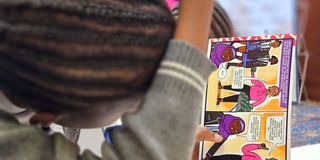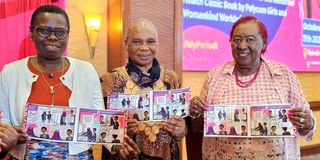Should I greet boys when I'm on my period? A young girl's journey through her first period

A girl reads a comic book on menstruation titled Siri ya Mwezi and launched in Nairobi on October 11, 2024.
What you need to know:
- Gina* says she felt more confident navigating her teenage years after her parents talked to her about menses and its effects.
- She spoke on International Day of the Girl during the launch of a comic book about menstruation titled Siri ya Mwezi (Secret of the Month).
Gina* was frightened. At just 12 years old and in Grade 5, she had no idea that something significant was about to unfold in her preteen life: her first period.
“The night it happened, I woke up to find my pajamas and sheets soiled,” recalls Gina, now a Grade 7 pupil from Kibra, Nairobi.
“I immediately ran to the bathroom to clean myself up and hurriedly washed my sheets.”
Initially, she didn’t confide in her mother until the mother discovered the truth after noticing drops of blood trailing behind Gina.
“I explained what was happening to me, and she bought me pads and taught me how to use them,” Gina shares.
“She also advised me to bathe at least three times a day to avoid any odor.”
However, her mother didn’t explain what having a period truly meant. Instead, Gina was left to wrestle with her fears and wild imaginations.
“I was terrified I would get pregnant just by sitting next to boys,” she admits. “I even changed my seating position in class to avoid them.”
Too shy to voice her worries, Gina struggled with questions like, “Should I greet boys when I’m on my period? Will people know I’m menstruating? Should I skip school until it’s over?”
A year later, a breakthrough occurred. While shopping with her father at a nearby supermarket, she picked up some pads.
As they left the store and headed home, her father turned to her and said, “I’m glad you’re not ashamed to buy pads in front of me. Don’t hesitate to let me know when your period is due.”
Gina said her father is a medical doctor and her mother is a teacher.
After that, her parents sat her down to explain what having a period meant, what to expect during menstruation, and the potential risks, including the possibility of pregnancy from sexual contact.
From that point on, Gina felt more confident navigating her teenage years. She also communicated with her parents when she struggled with premenstrual syndrome, which affected her concentration and performance at school.
“I experience severe lower back pain and struggle to walk and sit in class. Unfortunately, the pain lasts five to seven days,” she explains.
“In class, I can’t concentrate. I’m constantly shifting in my seat to alleviate the pain. Although my dad gives me painkillers, they rarely work. If I could, I’d just lie on my stomach.”

From left:Jane Anyango, Wahu Kaara, and Zipporah Kittony during the launch of a comic book on menstruation titled Siri ya Mwezi in Nairobi on October 11, 2024.
Gina is not alone in her experience with menstruation.
During the launch of a comic book about menstruation titled Siri ya Mwezi (Secret of the Month), nominated Senator Catherine Mumma shared her own feelings of confusion and embarrassment when she first got her period.
Launched on October 11, in celebration of International Day of the Girl Child, the book is a collaborative effort by Polycom Girls and WomanKind.
It humorously depicts girls' first experiences with menstruation, boys learning about it, and fathers supporting their daughters through their menstrual journeys. It aims to demystify the stigma and silence that often accompany this natural process.
In the book, a girl tells her father, “Dad, my period started today, and I think you promised me chocolate to celebrate.”
His response, “Of course, I did! Congratulations, Toto, your period is here!”
Jane Anyango, founder of Polycom Girls, emphasised the importance of breaking the taboo surrounding menstruation.
“Girls should never feel ashamed of their periods,” she said. “Instead, they need to be educated about menstrual hygiene and receive all the support they need.”
*Name of the girl has been changed to protect her identity and privacy.



